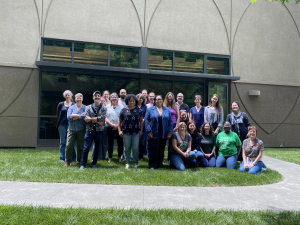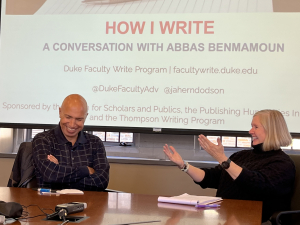Integrating Research and Teaching

On April 13, 2018, Reynolds and Schiff led a discussion at Duke’s Perkins Library on how faculty can integrate their research and teaching. Questions they addressed included: What is writing-to-learn? What is “hot” right now in the field of STEM education? How can researchers learn to live with the “messy data” involved in education research? And perhaps most importantly, what’s the best way to get started?
Julie Reynolds is a professor of biology at Duke University. Leslie Schiff is a professor of microbiology and immunology at the University of Minnesota, where she is also Associate Dean for the university curriculum. Together, they are collaborators on a $3 million research project funded by the National Science Foundation to improve STEM education through “writing-to-learn” pedagogy.
“Researchers already know that metacognition is good for learning,” Reynolds stated. But how can professors specifically target a learning disposition like metacognition, even in large lecture classes? Schiff’s and Reynolds’ research addresses questions such as these by testing the efficacy of “writing-to-learn” methods that promote metacognition analysis among students in a format suitable for introductory science classes. One intervention involves a professor asking students to write to a classmate explaining a tricky process or concept. Students then use a guided online peer review system to identify gaps in learning.
According to Schiff, these interventions allow instructors to better understand weak areas in student knowledge and target those who need help. They also allow students to see for themselves when they don’t understand a concept.
Testing whether such interventions work – and more importantly, why they work – is not easy. Education research is inherently complex, and Reynolds stresses that learning is impacted not only by academic factors but also by personal and social factors. She joked that her earlier research in population ecology makes her comfortable with large, messy data sets. “You can’t control all the factors in a classroom,” she says, any more than you can control all the variables in an ocean environment.
Nevertheless, pedagogy research is crucial to improving outcomes in a classroom, and a hot area of research is looking at factors that mediate and moderate learning. In other words, it is no longer sufficient simply to ask “what works” in classrooms; we have to drill down to ask why specific interventions work, and for whom.
So, how can professors get started in these kinds of projects? “Phone a friend,” say Schiff and Reynolds. Call someone else who is already doing educational research to see what your disciplinary knowledge can bring to the table. Attend a conference. Seek out the pedagogical research already being done in your field. Read the education forums in your scholarly journals.
For Schiff and Reynolds, the work has been tremendously rewarding. “It’s about finding your community,” says Schiff.



